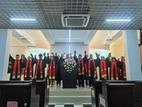A worship leader is crucial to creating effective worship. A worship leader with both professional musical skills and spiritual maturity can shape the atmosphere and guide the congregants into worship.
Christian life revolves around public worship, and the impact of worship on one’s soul depends on both the preparation of the church and the individual. Much of the conversation around church preparation focuses on form and musical style.
Through observations of worship across different regions and conversations with believers, it is clear that older adults can be deeply engaged in modern worship, while younger people can also immerse themselves in traditional hymns or folk-style praise songs. The benefits of worship lie in the quality of the worship team, especially the level of skill and spiritual maturity of the worship leader.
Among the qualities pastors emphasize when selecting and training worship leaders, being filled with the Holy Spirit consistently ranks as the top priority.
During my visits, I was particularly impressed by two grassroots worship leaders.
One of them, a forty-year-old Christian man leading a youth fellowship in Shangrao, Jiangxi, relies not on professional abilities such as timbre, pitch, and intonation, but entrusts the worship sectors to young musicians who have graduate from music schools. The moment he draws people into worship is his confession led by the Holy Spirit.
When worship leaders intersperse spoken words with songs, it can help believers understand and engage with the hymns. But some leaders, though leading the congregation to respond to God with passion, struggle to move their hearts. The difference lies in whether they are Spirit-led at the moment. If the excitement is merely human-driven rather than Spirit-driven, it fails to resonate.
Another worship leader was a young brother who leads worship at a church in Guiyang during Saturday evening services. Guided by the Spirit, he adjusts instruments and rhythms according to the atmosphere, sometimes using the piano as the main accompaniment, at other times playing the erhu. He shifts from soft singing to loud repetition according to the spiritual atmosphere. When he speaks, kneels, and calls passionately, believers do not feel it is a performance, nor do they feel compelled to respond, as everything is sealed by the Holy Spirit.
Whether in Chinese churches or in Western churches, pastors acknowledge that musical talent is not the primary criterion when selecting worship leaders. Yet, spirituality and professionalism are not mutually exclusive. Churches should strive to find worship leaders who possess both spiritual maturity and professional expertise.
During my visits to churches in Ningbo, there was a strong emphasis on the spirituality. Two churches there both had a large number of young attendees and preferred modern praise music accompanied by professional pianists, guitarists, and drummers. Before services, believers could be seen in prayerful preparation.
However, in one church, the worship leader often sang songs an octave lower, forgot lyrics when singing with closed eyes, or abruptly issued emotional calls to congregants. Though she is clearly a trusted pastor, her performance compromised the worship experience that evening. In contrast, the worship leader at the other church was both spiritually mature and professionally skilled; her adept singing maintained the flow of worship even in challenging and high-pitched parts, allowing hymns to linger in each person’s heart.
Musical expertise goes beyond singing ability; it also involves coordinating, harmonizing, and playing instruments. I once attended a Sunday worship where the drumbeat could have gradually built the narrative and emotional intensity of the main verse, culminating in a powerful climax. However, the worship leader frequently lagged behind, forcing the drummer to adjust, resulting in a fragmented rhythm. The intended climactic point that should have heightened the congregation’s experience turned into an awkward pause, diminishing the hymn's potential effect.
A spiritually mature worship leader understands the importance of their role and, for the benefit of the church and believers, continuously improve their professional skills. In other words, growth in musical professionalism is also the Holy Spirit’s transformative work within the individual.












